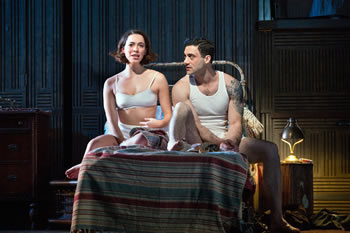HotReview.org Editor's
Picks
Shows Worth Seeing:

Machinal
By Sophie Treadwell
American Airlines Theatre
227 W. 42nd St.
Box office: (212) 719-1300
Written in 1928, Machinal is a pinnacle of American expressionism, a short-lived burst of Europhilic experimentation that also gave rise to Elmer Rice’s The Adding Machine and Eugene O’Neill’s The Emperor Jones and The Hairy Ape. With its rhythmic approach to language, generic characters with titles instead of names, cinematically cross-faded scenes, and physical depictions of emotion, these plays blew a bracing draft of pre-Depression fresh air into the stale environs of realistic American drama. Unlike the other, male-authored plays just mentioned, though, Treadwell’s work all but dropped out of sight after its premiere. Universities and off-theaters have occasionally produced it since its rediscovery by feminist critics in the 1980s, but this Roundabout production is its first return to Broadway since its premiere.
The story is loosely based on a sensational murder trial that Treadwell covered as a journalist. A character named Young Woman becomes increasingly desperate after feeling forced to marry a man she doesn’t love. In a string of episodic scenes she is shown utterly alienated from every role that ought to give her life meaning and purpose—secretary, wife, daughter, mother. She can’t manage ordinary office work, touch her husband affectionately, or nurse her baby. She has one fleeting moment of happiness with a hunk from a speakeasy, but afterward she again frets, simmers, churns, and ends up murdering her husband. At her trial, she tries to blame intruders for the crime and is sentenced to electrocution. Led to her death, she cries out pathetically for “Somebody.” Machinal indeed raises a host of fascinating feminist issues (many of which are well covered by Julia A. Walker in her book Expressionism and Modernism in the American Theatre). It powerfully dramatizes the production and enforcement of compulsory gender roles in a theatrical idiom that was never mainstream and is still provocative. The biggest question in this high-budget revival, directed by Lyndsey Turner, was whether that idiom could still feel at all edgy.
The answer is yes and no. Rebecca Hall is sturdy but not stellar as the Young Woman. She never smiles, even during the lover’s scene, and portrays a character so agitated and miserable that she seems doomed from the outset. This reactive approach makes her a bit too much of a cork tossed by impossibly huge forces rather than a responsible agent who might possibly have adjusted and saved herself. As the play’s only quasi-realistic character, the Young Woman is its only possible source of surprise (and passing hope) as it hurtles toward tragedy. That said, the production does depict those forces as pretty frightening and horrifying. Set designer Es Devlin has helped create an eerily omnipresent air of looming mechanistic violence. The set’s main element is a marvelous spinning box-like room that morphs seamlessly from office to hotel to speakeasy to courtroom to execution chamber and more, with the actors simply walking through doors to arrive at new places suffused with exactly the same air of spiritual emptiness they just left. The terrifying anguish of Treadwell’s airless world is on full display, and it's a rare sight.
